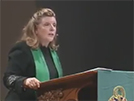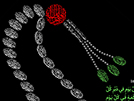3. Hijrat to the Prophet’s Death
- Details
- Hits: 3955
3. Hijrat to the Prophet’s Death
In Medina also ‘AlÄ« was constantly in the company of the prophet in private and in public. The Prophet gave FÄtima, his beloved daughter from Khadijah, to ‘AlÄ« as his wife in the 2nd year of the Hijrah.
When the Prophet was creating bonds of brotherhood among the Muslims of Medina and the Muslims who had migrated to Medina, he selected ‘AlÄ« as his own brother. He said, “O ‘AlÄ«, you are my brother in this world as well as the hereafter.”
‘AlÄ« was present in all the wars in which the Prophet participated, except the battle of Tabuk when he was ordered to stay in Medina in place of the Prophet. He did not retreat in any battle nor did he turn his face away from any enemy. He never disobeyed the Prophet, so that the Prophet said, “‘AlÄ« is never separated from the Truth nor the Truth from ‘AlÄ«.”
The courage of ‘AlÄ« was proverbial. In all the wars in which he participated during the lifetime of the Prophet, and also afterward, he never displayed fear or anxiety. Although in many battles such as those of Uhud, Hunayn, Khaybar and Khandaq the aides to the Prophet and the Muslim army trembled in fear or dispersed and fled, he never turned his back to the enemy. Never did a warrior or soldier engage ‘AlÄ« in battle and come out of it alive. Yet, with full chivalry he would never slay a weak enemy nor pursue those who fled. He would not engage in surprise attacks or in turning streams of water upon the enemy.
In the Battle of Khandaq, the Muslims had dug a ditch around their encampment. A very brave and famous Arab warrior, ‘Amr bin ‘Ubayd, jumped over the ditch with his horse and challenged the Muslims for combat with him. His courage and bravery was so well-known that no one among the Muslims dared to answer his challenge. The only person who readily agreed to face ‘Amr was ‘AlÄ« bin Abi TÄlib. When ‘AlÄ« was going to face ‘Amr, the Prophet said, “Today the total faith (imÄn) is going to face the total disbelief (kufr).” ‘AlÄ« defeated ‘Amr, and all other brave warrior’s of the enemy retreated.
In the Battle of Khaybar, the Muslim army attacked the fortresses of the Jews for many days but was not successful. Finally the Prophet declared that, “Tomorrow I will give the flag (i.e., the command) to one who will be steadfast in his position and not retreat until AllÄh blesses him with victory. AllÄh and the Messenger are his friends and he is their friend.” ‘AlÄ«, who had been in Medina because of eye ailment, joined the army on the next day and the Prophet gave the command to him. ‘AlÄ« marched to the fort of Khaybar and first defeated the bravest of all Jewish soldiers, Marhab, and then conquered the fort. It has been definitively established historically that while moving to conquer the fort, ‘AlÄ« reached the ring of the door and with sudden motion tore off the door and cast it away.
Also on the day when Mecca was conquered the Prophet ordered the idols to be broken. The idol “Hubal” was the largest idol in Mecca, a giant stone statue placed on the top of the Ka’bah. Following the command of the prophet, ‘AlÄ« placed his feet on the Prophet’s shoulders, climbed to the top of the Ka’bah, pulled “Hubal” from its place and cast it down.
While returning from the last pilgrimage, the Prophet openly and clearly introduced Imam ‘AlÄ« at Ghadir Khumm to thousands of Muslims who had accompanied him to hajj and declared that: “Whosoever’s master am I, this ‘AlÄ« is also his master.” He repeatedly said, “I am leaving two things behind and as long as you hold fast to them, you will never go astray: the Book of AllÄh (the Qur’Än) and my Ahlu ‘l-bayt (the Family).”
A few months after returning from hajj, the Prophet —peace and blessing of AllÄh be upon him— passed away from this world on 28th Safar, 11 A.H.



![take advantage of your [present] time](/en/media/com_hwdmediashare/files/99/f5/fb/5293162f4d04afb1ed8da3034e984340.jpg)







